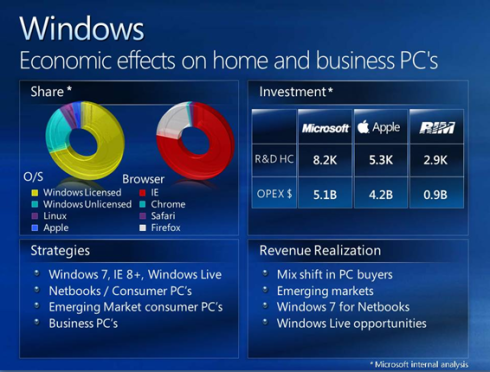12.04.10
Posted in America, Asia, Europe, GNU/Linux, Google, Intellectual Monopoly, Law, Microsoft, Patents at 10:54 am by Dr. Roy Schestowitz

Summary: A ‘free’ trade agreement (FTA) is being used to blackmail Korea into accepting the unacceptable, namely software patents
IT was only recently that the president of the FFII spotted a subscribers-only article and wrote:
US coalition asks for software patents in South Korea FTA, cites China and India TRIPS interpretation against swpats http://ur1.ca/2htvk
Thankfully we have some text from the article and with fair use doctrine we are able to give a flavour of it. “The article is copyrighted,” wrote an anonymous reader to us, “but maybe you could cite relevant parts of it,” said this reader, who had access to the text. They are “[p]ushing software patents through free trade agreements,” wrote a person who interpreted this article and here is the overall analysis:
According to the article below, a business coalition paper on IP issues is asking USTR to use TPP to:
-”replicate the IPR provisions of the U.S.-Korea free trade agreement, especially when it comes to patents and copyrights.
-go “beyond the Anti-Counterfeiting Trade Agreement (ACTA). For instance, it states that the TPP should outlaw camcording in theaters, despite the fact that the ACTA made it optional for countries to have criminal penalties for camcording.
-reject the “May 2007 compromise on patent provisions struck between the Bush administration and House Democrats, which weakened patent protections in FTAs that the U.S. had negotiated with developing countries.”
-include pharmaceutical chapter targeting the reimbursement policies of the Pharmaceutical Management Agency of New Zealand (PHARMAC)
-”demand that all TPP countries fully implement the World Intellectual Property Organization’s Copyright Treaty and the WIPO Performances and Phonograms Treaty (WPPT), something that New Zealand and Vietnam have not yet done”
To quote fragments from article “Inside U.S. Trade” (12/03/2010):
A confidential draft paper by a business coalition to advise the Office of the U.S. Trade Representative (USTR) on the intellectual property negotiations in the Trans-Pacific Partnership (TPP) talks shows that U.S. companies are fighting back against European Union efforts to protect geographical indications (GIs) in other countries.
Here come patents:
In provisions other than GIs, the paper largely urges the U.S. to replicate the IPR provisions of the U.S.-Korea free trade agreement, especially when it comes to patents and copyrights.
More on patents:
The Korea FTA was not affected by the IPR provisions of the May 2007 compromise, meaning that it contains what U.S. industry groups consider to be the highest level of protection to date. The paper does not delve into any specifics on patent linkage, data exclusivity and patent term extensions, which are the areas covered by the 2007 compromise.
Look who’s behind it:
This seemingly cautious approach by the business coalition differs from that of the Emergency Committee for American Trade (ECAT) and the National Association of Manufacturers (NAM), both coalition members,
which have publicly called on USTR not to repeat the 2007 compromise on IPR in the TPP negotiations.
The coalition paper was written by the Pharmaceutical Research and Manufacturers of America (PhRMA), the U.S. Chamber of Commerce, and the Motion Picture Association of America (MPAA), sources said.
Here come software patents:
The paper asks USTR to go beyond the Korea FTA in terms of computer implemented inventions, which are essentially patents on software.
This is how Microsoft extorts Samsung and LG (Korean companies), pulling money out of them for the use of Android.
Here’s TRIPS:
While the Korea FTA requires parties to uphold the Agreement on Trade-Related Aspects of Intellectual Property Rights (TRIPS), the problem with TRIPS is that many signatories, including China and India,
interpret it to mean that they do not have to provide patent protection for computer implemented inventions, according to the coalition paper.
More on TRIPS in [1, 2, 3, 4, 5] and here’s the next bunch of paragraphs:
“Thus, the language of the TPP agreement needs to be strengthened to specifically require providing patent protection for computer implemented inventions,” the paper argues.
The issue of computer implemented inventions touches on a larger debate on the scope of patent protection, one source said.
Patents clearly apply for new physical inventions or even a new process for performing a task. However, patents are generally not granted for formulas or algorithms, because that would be patenting knowledge itself, and would impede scientific progress, this source explained.
Outrageous. Recall who’s behind this. It’s not Koreans. On it goes, elucidating the US role in it:
While the U.S. currently grants software patents, some argue that these patents are essentially just the algorithm or formula itself, although written in computer code. If these software patents were all enforced, it could have the perverse effect of crippling the ability of different companies to innovate by devising new software, critics argue.
While companies currently amass these software patents, they do so largely for defensive reasons. Under this strategy, if a first company holding many software patents is challenged by another for infringement, it can look to try to find a case when that challenging company is also infringing a patent held by the first company, this source said.
This is untrue. Microsoft uses software patents offensively, e.g. against Linux and Android. They are just making up excuses for legalising software patents (calling them “defensive”, as if there is something about software which makes the already-granted patents inherently different).
What this amounts to is a sort of extortion and it helps show the US role in writing Korea’s law. Here is evidence of the continued attempts to impose US-style copyrights (the ‘Mickey Mouse’ law) on the whole world:
The draft also urges USTR to demand that all TPP countries fully implement the World Intellectual Property Organization’s Copyright Treaty and the WIPO Performances and Phonograms Treaty (WPPT), something that New Zealand and Vietnam have not yet done, another source pointed out.
Wikileaks has just unearthed another scandal. It’s just that, as Wikileaks helps show, Spain’s proposed copyright law was written by the United States. We wrote about it this morning while mentioning Amazon as one of the companies which set/write the laws in other countries like Canada (still wrestling against crazy copyright deform). Wikileaks has some ACTA-related leaks (cables) coming, so it is clear why US diplomats fight tooth and nail to take the site and its mirrors down (see the latest news below). Even France is now trying to ban the site, possibly because it turns out that Hadopi came from the United States. Sarko is being shown for the traitor he has been. █
Some other posts about Korea:
Latest Wikileaks news:
-
Industry Minister Eric Besson wrote a letter to business and technology leaders on Friday calling for ways to ban WikiLeaks from using servers in France, local media reported.
-
-
In response to the “killing” of Wikileaks.org by the US, countless mirror sites are springing up all over the world. It’s impossible to authoritatively catalog them all—too many mirrors, and too fluid of a situation. But here are some active indexes, which appear to be dynamically updating as new mirrors pop up.
• wikileaks.ch
• wikileaks.de
• wikileaks.fi
• wikileaks.nl
• Wikileaks.info
-
WikiLeaks founder Julian Assange will fight any bid to extradite him to Sweden over sexual misconduct allegations, and suspects foreign powers are influencing the authorities, his Swedish lawyer said on Friday.
-
Dear Prime Minister
From the Sydney Morning Herald I note you made a comment of “illegal” on the matter of Mr Assange in relation to the ongoing leaks of US diplomatic cables.
Previously your colleague and Attorney General the Honourable McClelland announced an investigation of possible criminality by Mr Assange.
As a lawyer and citizen I find this most disturbing, particularly so when a brief perusal of the Commonwealth Criminal Code shows that liability arises under the Espionage provisions, for example, only when it is the Commonwealth’s “secrets” that are disclosed and that there must be intent to damage the Commonwealth.
-
From The Arabist comes yet another warning of the career dangers of a fondness for WikiLeaks in the form of an email sent to students of their School of International and Public Affairs…
-
Popular Texas Republican Congressman Ron Paul is no stranger to breaking with his party, but in a recent television appearance the libertarian-leaning Rep. went even further than any member of Congress in defending whistleblower website WikiLeaks.
-
It’s been a long week for the whistle-blowing website WikiLeaks. Problems started to mount after Amazon and EveryDNS forced them to shuffle their hosting. While this was happening, they also had to face political posturing and arrest warrants. The truth can be a dangerous and wonderful thing.
Permalink
 Send this to a friend
Send this to a friend
Posted in Patents at 10:09 am by Dr. Roy Schestowitz

Photo by Steve Jurvetson from Menlo Park, USA
Summary: A look at some of the industry’s agitators, who are using patents to impede progress rather than actually develop
• Priceline Founder Jay Walker Now Files Patent Suits For A Living
We haven’t heard much from Jay Walker since he left the name-your-own-price travel website Priceline.com in 2000, after its stock slid from $162 to next to nothing in the dot-com bust. Now Walker Digital, the company he founded and still runs, has sued Facebook, claiming that he invented the concept of privacy-protected “friending” that underpins the social network. It’s the fourth patent suit Walker has filed in a bit over a year, and his boldest claim yet.
Walker began diving into the patent-litigation world about a year ago, when he sued Microsoft (NSDQ: MSFT), Dell and HP (NYSE: HPQ), saying that Microsoft Word infringes another of his patents, which covers searching the internet without closing the word-processor. He then sued Capital One, claiming the credit-card issuer violated two of his patents that cover “customizable credit accounts.” That lawsuit has already been thrown out by a Virginia judge, but Walker is appealing.
• Wi-Lan Just Keeps On Suing; Says Cable Modems Infringe Its Patents Too (Wi-Lan is a “technology licensing firm”)
Wi-Lan really is the patent troll that just keeps on suing. You may recall that the company — which once was an operating company that totally failed in the market, because it was unable to execute — has since become one of the nastier patent trolls out there, suing everyone it possibly can. Years back, it claimed that it had patents that covered the basics behind WiFi. After that, it claimed patents on mobile broadband offerings, like WiMax. It’s also sued over patents on mobile devices and near-field Bluetooth technology.
• Wi-Lan sues Comcast, Time Warner Cable, Charter
Technology licensing firm Wi-Lan Inc said it has initiated a patent infringement litigation against Comcast Corp, Time Warner Cable Inc, and Charter Communications in a U.S. federal court.
• Intel and Nvidia will settle a patent case
Permalink
 Send this to a friend
Send this to a friend
Posted in GNU/Linux, IBM, Microsoft, Patents, Red Hat at 10:01 am by Dr. Roy Schestowitz

Summary: Companies that are associated with (also paid by) Microsoft use software patents to cause damage in the Free software world
WE ALREADY know for a fact (based on press releases) that Microsoft has been paying Acacia on a few occasions. Bruce Perens once wrote that Microsoft’s “license payment to SCO is simply a good-looking way to pass along a bribe” and days ago we saw Microsoft paying TurboHercules as well. IBM calls such companies "satellite proxies". As Larry Goldfarb (a key investor in SCO) once put it: “Microsoft wished to promote SCO and its pending lawsuit against IBM and the Linux operating system. But Microsoft did not want to be seen as attacking IBM or Linux.”
Last month there was a lot of discussion about the unknown, namely Red Hat's NDA with Acacia, which we last mentioned a week ago (EN | ES). Sam Varghese says that Red Hat keeps dodging the issue, which also helps feed Microsoft mobbyists like Florian Müller. That’s just what Microsoft wants.
The query was simple: “Would Red Hat like to comment on Perens’ allegations? Would the company like to make the terms of the deal available to iTWire? Or do I accept Perens’ allegations as holding substance?”
It took two weeks of waiting but when a response arrived, it was meaningless.
“”Red Hat routinely addresses attempts to impede the innovative forces of open source via allegations of patent infringement,” ran the reply, routed through its PR company in Australia
“We can confirm that Red Hat, Inc and Software Tree LLC have settled patent litigation that was pending in federal court in the Eastern District of Texas (Civil Action No. 6:09-cv-00097-LED).”
The Microsoft-funded Blackboard, which is a software patents agitator, is giving up, but it has done enough to spread FUD about Free software like Moodle. To quote the only article we found about this latest development:
Blackboard Inc.’s protracted legal fight to retain the software patent it used to successfully sue course-management rival Desire2Learn is over. It lost.
The USPTO keeps granting software monopolies this week and they are celebrated with press releases [1, 2, 3], one of which reveals another pool of patents that sounds like more trouble: “Tippr said the patent license is separate from its white label group buying platform, and is aimed at patent licensing and protection to independent software developer, deal site, or publishers. The firm said that “no one else in the industry has a more comprehensive patent portfolio.”
Patent pools are essentially private clubs corresponding to a particular area in the industry; only companies which are well established in the areas are allowed into this club, assuming they were granted enough monopolies (patents). Those without patents will need to pay admission fees to the rest of the members of this club. There is a word to describe what goes in here. It’s called a “cartel”. █
Permalink
 Send this to a friend
Send this to a friend
Posted in Law, Microsoft, Patents at 9:20 am by Dr. Roy Schestowitz

Summary: North American patents on software are at stake again, but Microsoft is unlikely to let them burst into flames
JOHN PAUL STEVENS (ABOVE) RETIRED after ruling along with his colleagues in the Bilski case. An opportunity to kill software patents was essentially lost (depending on whose interpretation of the case is embraced.)
The law in the United States matters a lot at least as a precedence, for reasons that Wikileaks helps show this month (more on that later). We’ll cover software patents in Europe in a subsequent post because there is a lot of ugly stuff going on there, notably cronyism and lobbying from Microsoft. This post too is going to focus on Microsoft because VirnetX, which Microsoft paid a lot of money [1, 2, 3, 4, 5, 6, 7, 8, 9, 10, 11, 12, 13, 14, 15], “Receives European Security Patent” based on this new press release. This must be a software patent and VirnetX is a known patent troll/parasite/agitator. Europe needs to get rid of such an abomination, which first thrives in the United States and then tries to wrap its tentacles around companies overseas.
The patentability of software patents is pushed into the Supreme Court again, as some expected (we wrote about it several times this year). Joe Mullin, one of the better writers in this area, says that “Microsoft’s Supreme Court Case May Have Huge Benefits For Patent Defendants” and it’s important to remember the context.
The high court announced today that it will hear a patent challenge by Microsoft, which is seeking to overturn a big loss to i4i, a small Canadian company. After a jury trial in East Texas, i4i won $200 million and an injunction that required Microsoft to disable the XML editing function in its ubiquitous Microsoft Word program.
“Supreme Court Will Review The Standard For Patent Infringement: Could Raise The Bar,” argues Mike Masnick and here is the corresponding Slashdot discussion which could cite just about any among many articles like [1, 2, 3, 4, 5, 6]. Associated Press clarifies that SCOTUS is about “to review patent judgment against Microsoft”, so it’s not as though Microsoft is trying to fix the patent system. It’s just acting selfishly, so support from the EFF [via] is no indication of Microsoft being “good” or anything like that. Those who are familiar with the i4i case would know about trial misconduct from Microsoft and deliberate infringement which followed a form of spying from within i4i. Microsoft’s behaviour towards i4i has been despicable and the only reason it’s pursued this far is that Microsoft Word is at risk of being banned in north America. Microsoft cannot afford a ban on its #1 cash cow. Here is how Bloomberg puts it:
The U.S. Supreme Court will consider making some patents more vulnerable to legal challenge, agreeing to hear Microsoft Corp.’s appeal in a case that forced changes in the company’s Word software and may cost it $300 million.
Under the assumption that SCOTUS can invalidate all/many software patents here, Glyn Moody says he is “Rooting for Microsoft”. To quote him: “Although I’d prefer the entire system to be swept away at a stroke, I think that is somewhat unlikely, so I may have to settle for progressive improvements. And given the general inability of politicians to free themselves from the well-paid lobbyists in this area, the most promising avenue for change is probably that the companies most affected by software patents should do something about it through the courts.”
Katherine Noyes from IDG is the lady who covered it for PCWorld. How will Elena Kagan (below) rule/vote on the subject? Nobody knows for sure yet. Perhaps women will show that they can assess the economic impact of patents better than men can. Ginsburg had not been as involved as her male colleagues the last time around and then she retired (her husband died around the very same time the Bilski decision arrived). Laws are not absolute; they are theoretically made by people (or corporations in most cases) to fit society’s needs, so taking modernisation into consideration, laws must evolve over time. Will the United States come into alignment with the rest of the world by eliminating software patents or can it still afford to use diplomatic blackmail to assimilate others (more on that later)? █

Permalink
 Send this to a friend
Send this to a friend
Posted in IBM, Microsoft, Patents at 8:37 am by Dr. Roy Schestowitz

Summary: IBM uses voluntary peer review to annotate software patents
EVERY NOW and then we receive mail from Peer To Patent, which is an initiative whose method we disagree with because it helps legitimise software patents rather than just abolish the whole lot. Peer To Patent has come back to life recently, owing to IBM’s financial support [1, 2] (IBM is part of the problem, not the real solution to it). That said, IBM does strive to defend Linux from Microsoft et al. and OIN is just one example of that. Based on the latest message from Peer To Patent, they might be trying to force re-examination (and invalidation) of the following patents, mostly Microsoft’s:
New Technologies on Peer To Patent
With just over a month into the third pilot program, Peer To Patent is moving into technologies outside of computer software and business methods. A major aspect of this third iteration of Peer To Patent is to test its efficacy in various fields. For the first time, Voice/Speech Recognition and Organic Compounds patent applications have been added to the Peer To Patent application list. This is our opportunity to improve patent quality in a multitude of technologies! Please take this chance to participate by tagging these applications, contributing to discussions, submitting prior art, or even sharing research tips.
Class 704- Data Processing
Transcription, archiving and threading of voice communications (Microsoft)
Maximum entropy model with continuous features (Microsoft)
Feature compensation approach to robust speech recognition (Microsoft)
Adaptive pattern learning for bilingual data mining (Microsoft)
Class 544- Organic Compounds
Method of preparing cyclic carbonates, cyclic carbamates, cyclic ureas, cyclic thiocarbonates, cyclic thiocarbamates and cyclic dithiocarbonates (IBM)
We thank you for all of your support!
Your Peer To Patent Team
www.peertopatent.org
The approach taken here can help further validate the patents above. Surely there’s a better way than Peer To Patent’s and OIN’s. As Carlo Piana put it, “the *only* solution is abolition NOW” (more on the situation in Europe later). █
Permalink
 Send this to a friend
Send this to a friend
Posted in Free/Libre Software, Patents at 8:20 am by Dr. Roy Schestowitz

Phones can be stolen, phone ideas cannot
Summary: Patent infringement is not “theft” and not “piracy” either, even when developers are ripped off by the likes of Tandberg
ABOUT a week ago we wrote about Tandberg and we are flattered to be cited by Patrick Anderson, who is in the patents business and plays somewhat of an apologist’s role for it in his post “Pirated Patents?”
One polite request which ought to be made to Mr. Anderson is that he should help drop this silly vocabulary and show respect to people whose only ‘crime’ is inspiration or imitation. “Pirates” are actually a vicious class of men who pillage and plunder, even murder. Patent lawyers could be called “rapists” (for raping defendants for their money), but this is generally not done. What Tandberg does is abominable not because they take/inherit someone else’s idea; it’s the fact they strive to get a monopoly with which to practically exclude the original innovators, the source if the idea/s. This is utterly malicious and it’s facilitated by the USPTO.
Anderson beat us to it with links that we were about to use anyway because there was a limited number of blogs that covered the Tandberg saga (accumulated here since December first), not the mainstream news. A few days ago we caught this coverage and Mike Masnick’s belated coverage, which says:
The first, found via Dave Farber’s IP list is a patent which an open source developer suggests almost identically matches code that he committed to an open source project. The guy who wrote that post has since backed down a bit on his original claims that the patent was clearly “copied” from his open source commits, but still notes that the patent application in question is ridiculous.
Then there’s a similar story, found via Slashdot of a guy who coded an open source library for Windows in 2001 (inspired by a Bruce Perens project from 12 years earlier) and just discovered that IBM appears to have patented the same technology — even mentioning this guy’s own blog post in the references section.
Just before leaving ZDNet’s “Linux and Open Source” blog (now in good hands under Steven J. Vaughan-Nichols, aka SJVN), Dana correctly pointed out that “Tandberg illustrates stupidity of software patent policy”.
Tandberg, the videoconferencing unit of Cisco that some reporters have called a patent troll, has accidentally revealed the stupidity of software patents with a recent application.
X264 developer Jason Garrett-Glaser, a student at Harvey Mudd College (from which this picture was taken after Apple co-founder Steve Jobs referenced his blog) wrote that Tandberg had tried to patent his open source code.
In later posts we are going to go deeper into the software patents news. A lot is going on right now. It can easily determine who wins the operating systems ‘war’. █
Permalink
 Send this to a friend
Send this to a friend
Posted in Microsoft, Site News at 7:55 am by Dr. Roy Schestowitz

Summary: Request for quick reports about Microsoft products which are being killed by Microsoft
In late 2008 we began assembling a bunch of posts about products that Microsoft had begun axing. In 2009 we turned this into an editable Wiki page, which has so far been viewed over 7,553 times in non-cached requests (our server has a cache proxy in front of it, so some pages are delivered without the Web server ‘knowing’ about it, especially the Wiki index which got around 100 times that number).
“When civil disobedience becomes the norm it usually means the law needs to be amended.”Now that Microsoft’s WHS seems to be dying and we no longer keep a close eye on Microsoft, we need readers to report to us when a Microsoft product dies so that we can add it to the list. We have probably missed several already.
Microsoft does not matter all that much anymore, but documenting its “death spiral” (Microsoft terminology) is worthwhile. Keeping a list of dead products is one logical way. Please report to us (preferably via IRC) if we missed something. Today we do a special series of posts about patents (a phenomenon/law), not a company. It will probably be more effective and it’s a subject that affects me personally as I am coding all weekend and with patents on basic things like a progress bar, it is clear that there are injustices like criminalisation of all programmers. When civil disobedience becomes the norm it usually means the law needs to be amended. █
Permalink
 Send this to a friend
Send this to a friend
Posted in Apple, GNU/Linux, Google, Microsoft, Patents at 7:31 am by Dr. Roy Schestowitz

Summary: As more desks are being emptied or vacated owing to portability, it is portable devices that GNU/Linux needs to target; software patents are Apple’s and Microsoft’s only viable response
PHONES (featurephones or smartphones) are a growth area which is further complemented by mobile devices like tablets. This comes at the expense of the so-called ‘desktop’ to a certain extent. Microsoft knows this and even admits this sometimes. Vista 7 is not suitable for such devices and Microsoft is unable to make Vista Phony 7 [sic] stick (the company needs it for form factors like tablets). In such a situation Microsoft can just give up, acquire a winning team, or try again to leapfrog the competition with a new product. But instead, Microsoft is extorting for products it does not make to pay up, in order to serve as a sort of corporate welfare. A mobile technology news site says in the headline that “Microsoft sees revenue potential in smartphone-related patents” and this claim sometimes comes from Microsoft’s own mouth. Rupert Murdoch’s AllThingsD has another opinion: “Microsoft’s top lawyer, Brad Smith, said the company’s road to success in mobile isn’t based solely on its Windows Phone 7 operating system. According to AllThingsD, Smith said the company also believes it can make money from its vast pool of smartphone-related patents. However, he conceded that the money Microsoft could make per phone from patents isn’t as much as it could get via sales of phones running Microsoft software.”
According to news that we pinned down yesterday, most the phones sold in China are now running Linux (Android) and despite its loyalty to client like Microsoft, the Gartner Group acknowledges that Microsoft’s bread and butter gradually recede [1, 2, 3]. “Tablets putting a drag on PC sales” is one way of putting it and clearly enough Gartner is trying to bury its false predictions (there are many):
-
TABLET AND SMARTPHONE sales are thought to be behind lower than expected growth in PC shipments, according to Gartner.
The IT market research firm is now expecting a 14.3 per cent increase in PC shipments in 2010 over 2009, down from a prediction it made in September that the year would see 17.9 per cent growth. Gartner views tablet and smartphone sales as reasons for that and the company expects tablets to grab 10 per cent of the PC market by 2014.
A few hours ago we showed that Apple — like Microsoft — resorted to using software patents against mobile Linux, which is self explanatory.
-
I’ve said this before but if you feel the best way to promote your product is to attack the opposition you have already lost. Fear uncertainty and doubt (FUD) is a well known tactic and exists not only in the software world. Free software supporters have been quoting Ghandi’s “ignore, ridicule, fight, win” quote for a long time. By launching these attacks both Microsoft and Jobs appear to have belied their fear of the rival product and aligned themselves with step 3 of that process. Despite the rhetoric that came from Redmond and Apple supporters following these stories, the truth is that both OpenOffice.org and Android have made big enough dents in their markets to wake up the sleeping giant monopolists.
The latter post from Ryan Cartwright is as optimistic as it ought to be. Linux is in many ways winning, but it is not known as “Linux”. Just as “Linux” stole GNU’s thunder, brand names like Android and Ubuntu are now stealing Linux’ thunder. Articles by Joab Jackson and others make it clear that Microsoft is now focused on patents, not products.
The software giant filed a patent yesterday, in which it proposes to deploy a layer of shape-memory plastic that would change the surface of the screen when hit with different wavelengths of ultraviolet light.
Microsoft wishes to become a so-called “licensing company” (euphemism for patent taxation centre) because it cannot grow past the desktop, which seems like a shrinking market. GNU/Linux need not aspire to take over the desktop if the desktop itself (as we know it today) is quickly changing with advances in nano-technology.
Paul Grim explained a month ago “Why Apple can’t beat Android” either:
For the better part of 20 years, Mac lovers fumed in frustration as Apple languished in sub-5% PC market share territory. Wintel dominated. Big, ugly, buggy, clunky, and everywhere. It seemed as if graphic designers were the only people stubbornly refusing to admit defeat and join the rest of the planet in using Windows.
Gerard Braad, an amicable mobile Linux developer who was recently elected for Fedora leadership, says that “Oracle and #TheSteve [Job] couldn’t keep the promise yet, but Henri Gomez made [...] #OpenJDK on #OSX http://blog.hgomez.net/?p=670″
On the desktop too GNU/Linux is said to have greater market share than Apple’s (see Ballmer’s slide below). The world is bigger than the United States, but last week a lot of Web sites were referencing the bunk from Net Applications. █
 f
f
Permalink
 Send this to a friend
Send this to a friend
« Previous Page — « Previous entries « Previous Page · Next Page » Next entries » — Next Page »
Further Recent Posts
- Links 6/1/2017: Irssi 1.0.0, KaOS 2017.01 Released
Links for the day
- Watchtroll a Fake News Site in Lobbying Mode and Attack Mode Against Those Who Don't Agree (Even PTAB and Judges)
A look at some of the latest spin and the latest shaming courtesy of the patent microcosm, which behaves so poorly that one has to wonder if its objective is to alienate everyone
- The Productivity Commission Warns Against Patent Maximalism, Which is Where China (SIPO) is Heading Along With EPO
In defiance of common sense and everything that public officials or academics keep saying (European, Australian, American), China's SIPO and Europe's EPO want us to believe that when it comes to patents it's "the more, the merrier"
- Technical Failure of the European Patent Office (EPO) a Growing Cause for Concern
The problem associated with Battistelli's strategy of increasing so-called 'production' by granting in haste everything on the shelf is quickly being grasped by patent professionals (outside EPO), not just patent examiners (inside EPO)
- Links 5/1/2017: Inkscape 0.92, GNU Sed 4.3
Links for the day
- Links 4/1/2017: Cutelyst 1.2.0 and Lumina 1.2 Desktop Released
Links for the day
- Financial Giants Will Attempt to Dominate or Control Bitcoin, Blockchain and Other Disruptive Free Software Using Software Patents
Free/Open Source software in the currency and trading world promised to emancipate us from the yoke of banking conglomerates, but a gold rush for software patents threatens to jeopardise any meaningful change or progress
- New Article From Heise Explains Erosion of Patent Quality at the European Patent Office (EPO)
To nobody's surprise, the past half a decade saw accelerating demise in quality of European Patents (EPs) and it is the fault of Battistelli's notorious policies
- Insensitivity at the EPO’s Management – Part V: Suspension of Salary and Unfair Trials
One of the lesser-publicised cases of EPO witch-hunting, wherein a member of staff is denied a salary "without any notification"
- Links 3/1/2017: Microsoft Imposing TPM2 on Linux, ASUS Bringing Out Android Phones
Links for the day
- Links 2/1/2017: Neptune 4.5.3 Release, Netrunner Desktop 17.01 Released
Links for the day
- Teaser: Corruption Indictments Brought Against Vice-President of the European Patent Office (EPO)
New trouble for Željko Topić in Strasbourg, making it yet another EPO Vice-President who is on shaky grounds and paving the way to managerial collapse/avalanche at the EPO
- 365 Days Later, German Justice Minister Heiko Maas Remains Silent and Thus Complicit in EPO Abuses on German Soil
The utter lack of participation, involvement or even intervention by German authorities serve to confirm that the government of Germany is very much complicit in the EPO's abuses, by refusing to do anything to stop them
- Battistelli's Idea of 'Independent' 'External' 'Social' 'Study' is Something to BUY From Notorious Firm PwC
The sham which is the so-called 'social' 'study' as explained by the Central Staff Committee last year, well before the results came out
- Europe Should Listen to SMEs Regarding the UPC, as Battistelli, Team UPC and the Select Committee Lie About It
Another example of UPC promotion from within the EPO (a committee dedicated to UPC promotion), in spite of everything we know about opposition to the UPC from small businesses (not the imaginary ones which Team UPC claims to speak 'on behalf' of)
- Video: French State Secretary for Digital Economy Speaks Out Against Benoît Battistelli at Battistelli's PR Event
Uploaded by SUEPO earlier today was the above video, which shows how last year's party (actually 2015) was spoiled for Battistelli by the French State Secretary for Digital Economy, Axelle Lemaire, echoing the French government's concern about union busting etc. at the EPO (only to be rudely censored by Battistelli's 'media partner')
- When EPO Vice-President, Who Will Resign Soon, Made a Mockery of the EPO
Leaked letter from Willy Minnoye/management to the people who are supposed to oversee EPO management
- No Separation of Powers or Justice at the EPO: Reign of Terror by Battistelli Explained in Letter to the Administrative Council
In violation of international labour laws, Team Battistelli marches on and engages in a union-busting race against the clock, relying on immunity to keep this gravy train rolling before an inevitable crash
- FFPE-EPO is a Zombie (if Not Dead) Yellow Union Whose Only de Facto Purpose Has Been Attacking the EPO's Staff Union
A new year's reminder that the EPO has only one legitimate union, the Staff Union of the EPO (SUEPO), whereas FFPE-EPO serves virtually no purpose other than to attack SUEPO, more so after signing a deal with the devil (Battistelli)
- EPO Select Committee is Wrong About the Unitary Patent (UPC)
The UPC is neither desirable nor practical, especially now that the EPO lowers patent quality; but does the Select Committee understand that?
- Links 1/1/2017: KDE Plasma 5.9 Coming, PelicanHPC 4.1
Links for the day
- 2016: The Year EPO Staff Went on Strike, Possibly “Biggest Ever Strike in the History of the EPO.”
A look back at a key event inside the EPO, which marked somewhat of a breaking point for Team Battistelli
- Open EPO Letter Bemoans Battistelli's Antisocial Autocracy Disguised/Camouflaged Under the Misleading Term “Social Democracy”
Orwellian misuse of terms by the EPO, which keeps using the term "social democracy" whilst actually pushing further and further towards a totalitarian regime led by 'King' Battistelli
- EPO's Central Staff Committee Complains About Battistelli's Bodyguards Fetish and Corruption of the Media
Even the EPO's Central Staff Committee (not SUEPO) understands that Battistelli brings waste and disgrace to the Office
- Translation of French Texts About Battistelli and His Awful Perception of Omnipotence
The paradigm of totalitarian control, inability to admit mistakes and tendency to lie all the time is backfiring on the EPO rather than making it stronger
- 2016 in Review and Plans for 2017
A look back and a quick look at the road ahead, as 2016 comes to an end
- Links 31/12/2016: Firefox 52 Improves Privacy, Tizen Comes to Middle East
Links for the day
- Korea's Challenge of Abusive Patents, China's Race to the Bottom, and the United States' Gradual Improvement
An outline of recent stories about patents, where patent quality is key, reflecting upon the population's interests rather than the interests of few very powerful corporations
- German Justice Minister Heiko Maas, Who Flagrantly Ignores Serious EPO Abuses, Helps Battistelli's Agenda ('Reform') With the UPC
The role played by Heiko Maas in the UPC, which would harm businesses and people all across Europe, is becoming clearer and hence his motivation/desire to keep Team Battistelli in tact, in spite of endless abuses on German soil
- Links 30/12/2016: KDE for FreeBSD, Automotive Grade Linux UCB 3.0
Links for the day



























 Content is available under CC-BY-SA
Content is available under CC-BY-SA